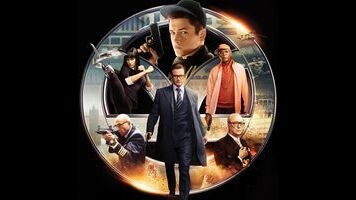Kingsman is a slick, gory spy pastiche—just don’t think about it too hard

Kingsman: The Secret Service is a live-action Hammacher Schlemmer catalog of pseudo-retro novelties, spiced up with self-aware asides and over-the-top violence—slick entertainment, provided the viewer turns off whatever part of their brain is responsible for recognizing and parsing subtext. Very loosely adapted from a Mark Millar comic by Jane Goodman and director Matthew Vaughn—who were also responsible for the Millar adaptation Kick-Ass—Kingsman centers on an “independent spy agency,” which is headquartered in London’s Savile Row and outfits its agents with bulletproof umbrellas, perfectly tailored suits, and hi-tech Harry Palmer glasses. It’s an exaggerated pastiche of Cold War-era spy shows and James Bond films, with characters continually bringing up Bond and martinis in the dialogue, just in case the audience doesn’t catch on.
Self-awareness can be subversive, but not if it’s the only end goal. Far from being a Team America-style send-up of gentleman spy movies, Kingsman is actually even more reactionary than the movies it’s referencing; it traffics in the kind of Tory values Bond flicks merely suggest, building to a finale that can only be described as an ideological can of worms that can’t be opened without spoiling the movie’s third act and whatever fun a viewer might have watching it play out. (Let’s just say that Barack Obama is in cahoots with the bad guys and Ronald Reagan helps save the day.) And, the thing is, the movie is fun, at least from a visual design standpoint, even though it’s hard to separate its bespoke fashions, future-vintage gadgets, and aristocratic décor from its fusty worldview. As in X-Men: First Class, Vaughn shows a real knack for integrating flashy production design and complex effects sequences, most notably during a couple of super-violent, bone-cracking, head-impaling hand-to-hand fight scenes.
Colin Firth stars as Harry Hart, a veteran Kingsman agent tasked with finding a new recruit after one of his colleagues ends up dead—sliced neatly down the middle by a henchwoman (dancer Sofia Boutella) with razor-sharp prosthetic legs—while trying to rescue kooky climate scientist Professor Arnold (Mark Hamill). Harry’s pick is working-class, public-housing-bred delinquent Eggsy (Taron Egerton)—much to the apparent dismay of the head of the agency (Michael Caine, naturally), who is codenamed “Arthur.” (Harry is codenamed “Galahad,” while the agency’s Q stand-in—played by Mark Strong—is known only as “Merlin.”) Sent off to the Kingsman mansion via a giant pneumatic tube, Eggsy finds himself as one of dozen candidates competing for a chance to become the agency’s new “Lancelot,” learning marksmanship and survival skills alongside lessons in manners and style.
Kingsman’s central conflict can best be described as “snobs vs. gentlemen.” The former category includes most of Eggsy’s fellow Kingsman candidates and megalomaniac dot-com billionaire Richmond Valentine (Samuel L. Jacskon, dressed like Spike Lee and speaking with a lisp), who has a convoluted plan to save the planet by killing off most of its population. The latter is embodied by Harry, Kingsman candidate Roxy (Sophie Cookson), and eventually Eggsy.
That sounds palatable, but it’s soured by the movie’s vision of the working class as composed entirely of promiscuous women and the lowlifes who beat them, and by Harry’s definition of a gentleman as someone who looks down on his past self, whereas snobs look down on others. Anyone can be a gentleman, regardless of gender or socioeconomic background, provided they adopt the look and bearing of the idealized, mid-century British upper class. Gentlemen, not elected governments, are the only ones fit to run the world. (Readers wondering whether this is a case of a critic reading too deep into an often funny spy pastiche should know that this idea is explicitly expressed in the movie several times over, and is the motivating ideology of the Kingsman agency, which has no government ties and is funded by old money.)
This is a long way of saying that Kingsman is ideologically vapid—unless, of course, a viewer believes that the world is better off being run by shadowy, Napoleonic, brandy-sipping patricians, and that socially or economically disadvantaged groups will wallow in filth if left to their own devices, and can only achieve anything by imitating their betters. (This worldview is also known as snobbery. Go figure.) Vaughn—who produced Guy Ritchie’s early work and shares Ritchie’s taste for visual flashiness—can’t make these political points seem any less stupid, nor is he trying to; they’re the animating force behind the whole movie. What he does do, however, is mine them for jokes and gory kicks, whether it’s the aforementioned blade-footed henchwoman carefully unwrapping a tray of Big Macs in the background of a tense conversation between Harry and Richmond Valentine, or the movie’s climax, in which bodies explode like fireworks. How much a prospective viewer might end up enjoying Kingsman probably depends on how much they’re willing to ignore in the interest of being entertained, or whether they prefer the kind of entertainment that doesn’t require a mental off switch.
For thoughts on, and a place to discuss, the plot details not talked about in this review, visit Kingsman’s spoiler space.